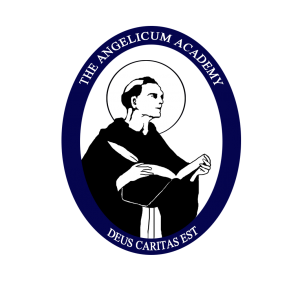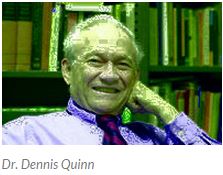 THE MUSES AS PEDAGOGUES OF THE LIBERAL ARTS
THE MUSES AS PEDAGOGUES OF THE LIBERAL ARTS
by Dennis Quinn
Before I begin, I have two points to make. First, the pedagogical theory that I present is not new. Its foundations are in classical antiquity, notably in Plato’s Republic; Aristotle later endorsed it in the Politics. Its briefest enunciation occurs in The Laws, where Plato’s spokesman says, “Shall we begin with the acknowledgement that education is first given through Apollo and the Muses?” (Laws 654A). I take Plato to mean here that the Muses furnish the principle which not only begins education but permeates and sustains it in all stages. This musical approach was actually implemented by the Greeks and others in Western culture (and no doubt in others as well), but I have no intention of arguing that historical point here or even that the theory is Plato’s. What I wish to do is describe the theory and defend it as a principle of integrating the teaching of liberal arts.
A second prolegomenous note is that I have actually employed the theory I shall advocate. It was the animating principle of the Integrated Humanities Program, a four-semester Great Books course which I directed and in which I taught at the University of Kansas from 1966 until 1982. This program was highly successful in attracting and retaining large numbers of underclass students, most of whom felt it to be the most valuable part of their college education. This program was strongly influenced by the Great Books idea promoted by Mr. Adler. Our approach to Great Books, however, differed precisely in the emphasis placed on the muses, instead of the dialectical approach dominant in the Chicago, Columbia, and St. John’s programs. I repeat the title of the Kansas experiment: The Integrated Humanities Program. It was our intention to give students an introduction to various humanistic disciplines, but there is no reason that the whole of the liberal arts and sciences cannot be similarly integrated.
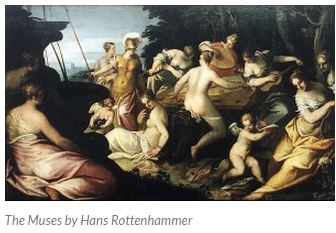 What do I mean by education by the Muses? Or to use a more convenient term, Musical (capital M) education? We all know the deities that the Greeks called Muses – the nine daughters of Zeus, begotten upon Mnemosyne, goddess of memory. They are the inspirers of various kinds of poetry (tragic, comic, lyric, religious and epic) and of dance, history, and astronomy. Education begins with the Muses because children begin their learning with things Musical. We first teach children stories and songs, to which, along with dancing, children are naturally drawn. This is not an advanced education, but rather one that is elementary. The word “elementary” unfortunately has taken a pejorative connotation, as if it involves something contemptible and childish, as in Sherlock Holmes’ condescending “Elementary”, when Watson expresses amazement at the detective’s deductions. The word means just the opposite of its derogatory sense of trivial; for what is elemental is essential, primary, constitutive, concerning principles – as air, earth, fire and water were the ancient elements.
What do I mean by education by the Muses? Or to use a more convenient term, Musical (capital M) education? We all know the deities that the Greeks called Muses – the nine daughters of Zeus, begotten upon Mnemosyne, goddess of memory. They are the inspirers of various kinds of poetry (tragic, comic, lyric, religious and epic) and of dance, history, and astronomy. Education begins with the Muses because children begin their learning with things Musical. We first teach children stories and songs, to which, along with dancing, children are naturally drawn. This is not an advanced education, but rather one that is elementary. The word “elementary” unfortunately has taken a pejorative connotation, as if it involves something contemptible and childish, as in Sherlock Holmes’ condescending “Elementary”, when Watson expresses amazement at the detective’s deductions. The word means just the opposite of its derogatory sense of trivial; for what is elemental is essential, primary, constitutive, concerning principles – as air, earth, fire and water were the ancient elements.
Nor is the elementary merely what is easy. An element is something simple, in the sense that it is indivisible, without parts. That is the etymological meaning of simple – semel ply, not folded over, as opposed to the complex. The word simple has suffered the same fate as “elementary” in acquiring a connotation of triviality. Sherlock Holmes, again, says that his abstruse cases are “ridiculously” or “childishly simple.” Although simple things may appear to be obvious, they are not easy precisely because they cannot be broken down into parts, subjected to analysis. The soul is an example, or the point in geometry, or love, or God. Things elementary are, in fact supremely mysterious – easy to recognize, but hard to describe. Milton said that poetry is simple, and so it is, despite the efforts of critics and scholars to render it complex. All of the Muses and their products are simple, and they address what is simple – the real, human sorrow, the good, the true and the beautiful.
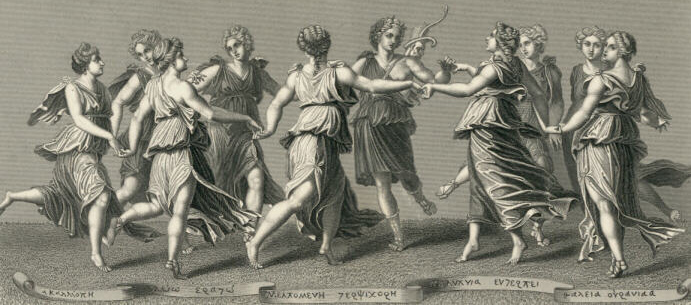 The Muses are integrative because they deal with things as wholes that are greater than the sum of their parts. The simplest love lyrics (and the simpler the lyric the better) always tell us something about the whole of love. Thus, education by the Muses begins with the assumption that the whole should be learned before the parts, whereas contemporary education under the influence of the analytical sciences (I almost said analytical sciences, gives us the parts first and pretty much expects us to make a whole out of them for ourselves.
The Muses are integrative because they deal with things as wholes that are greater than the sum of their parts. The simplest love lyrics (and the simpler the lyric the better) always tell us something about the whole of love. Thus, education by the Muses begins with the assumption that the whole should be learned before the parts, whereas contemporary education under the influence of the analytical sciences (I almost said analytical sciences, gives us the parts first and pretty much expects us to make a whole out of them for ourselves.
Apollo and the Muses educate beginners, amateurs, those who seek understanding for the love of it, rather than for the prospect of gain, as is so common among the career oriented. At the university we call the beginners freshman, who are capable of hearing the song of the Muses because they present life fresh, as if experienced for the first time. In philosophy Socrates is the great beginner, the perrenial freshman, who never lost his amateur status and who insisted that philosophy is nothing more than what the word means literally, the love of wisdom. The sophomore, the sophisticate, and the Sophists have in common the claim of possessing wisdom.
At the beginning of any art or science is a principle. The word “principle” itself means “first”, and it is related to the word “fresh”. Hence in Latin the book of Genesis begins, in principio. Once again, however, we recall that principles are not first only as the first in a sequence is first. The letter “A” for example is not the principle of the alphabet, but only the first letter. The number one, on the other hand, is the principle of number because all numbers contain one. This is why the Greeks said that one is not a number at all.
To speak philosophically, principles are per se nota, known by themselves or self-evident, fundamental because they are not based on any more elementary truth. Like all simple things, principles are obvious but profoundly mysterious. One learns them by experience – not by one particular kind of experience, but by all experience. In the study of logic as an art, we learn the principle of non-contradiction, but those who have never observed the existential bearing of this principle in life, will never learn it in logic. The principle of ethics is that the good must be done. Great poets take this as given, teaching it without asserting it explicitly. The principle of philosophy, as Plato and Aristotle affirm is the passion of wonder, the fundamental passion that the Muses arouse.
What excites the passion of wonder is the confrontation of mystery, the dominant domain of the Muses. Mystery is in the very root of their name, the Greek mu. The same syllable occurs in the Greek mythos, which means “story.” Perhaps the root goes back to the closed-lipped sound that calls for silence – as in “mum’s the word.” Hence the word mute comes from the same root as music, myth, Muse, and mystery, Our posture before the great mysteries of ordinary experience is one of suspended and silent attention or musing, not of active inquiry. This is precisely the attitude begotten by wonder. Mystery may best be understood by contrasting it to the problematic. Songs, stories, pictures do not deal with problems for which there are definitive solutions, but rather with what Gerard Manley Hopkins called “incomprehensible certainties.” truths obvious but dark. One great lover of definitive solutions (including the 7 percent variety) is Sherlock Holmes, again. The cry of that admirable sleuth (himself an object of wonder) is, “Give me problems!” and his dismissive question, “What is the mystery in all this?”
The Muses address the beginner not only in their presentation of elementary things, but also in their mode of representation. They do not address the intellect primarily; they do not descant in dialectic. They are not rhetoriticians who aim to persuade. they do not pretend to “prove” anything. We have become accustomed to idealogical novels, but the Muse deserts even Tolstoi when he begins to preach.
Our initial response to anything musical is simple delight, which naturally arises when we see or hear something well represented or imitated. We look at the horse on the Parthenon freeze and exclaim, “Yes, those are horses!” That is how they are!” now that realization does require an act of intellectual judgment, but it is not a high level of abstraction; it involves only the ability to see similarities and to see particular objects as good in relation to ourselves. The Muses ask very little of us really in the way of thought. They often say no more than “Behold!” as when they speak through Gerard Manley Hopkins:
“Look at the stars! look, look up at the skies!
O look at all the fire-folk sitting in the air!
(70-71)
Kipling has a poem with a refrain that puts the matter very well:
For to admire and for to see
And for to behold this world so wide.
It never done no good for me,
But I can’t drop it if I tried.
(455-56)
That is the “evening song” of a Cockney soldier. The word “admire”, by the way, means to look upon with praising wonder.
Much of what the Muses do is simply to cultivate and awaken attention to the world – what Wadsworth called “passionate regard” and Hopkins called an “ecstasy of interest” It is deplorable that college students cannot write and read and work mathematics and speak well; but it is worse when they are blind and deaf, insensible to the “world so wide.” Contemporary students often find it difficult to follow a train of reasoning, but the cause of that deficiency is not insufficient training in logic but rather the failure to use their senses, for, as Aristotle teaches, all knowledge begins in the senses.
The Muses, I should add, are not responsible for the direct training of the senses. That part of education, which should precede that of the Muses, is gymnastics, training in the immediate or naked contact with sensible reality. This essential aspect of education, so important to the ancients, is sadly neglected today because of the exaggerated emphasis on competitive sports. Among the Muses, Terpsychore, the goddess of the dance, combines gymnastics and musical education, however. In the Integrated Humanities Program, we taught students the waltz; it was immensely popular.
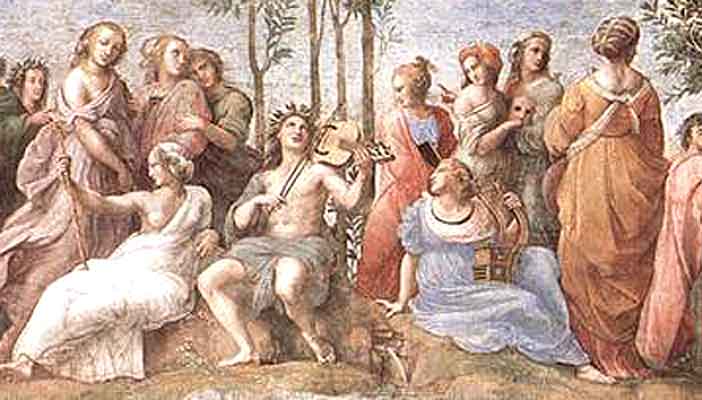 As the daughters of Mnemosyne, the Muses particularly address the memory and the closely related faculty of imagination. After the external senses, it is these senses that must be educated. Clearly, the works of the Muses have a natural affinity for the memory. The first thing to do with a poem or song is simply to learn it by heart. Modern educationists have a bugbear of memorization, but it is a necessary, healthful, and even pleasant activity, especially where the material is pleasing. It is good to know poetry and songs by heart because they conform the soul to harmony and eloquence by their own power. If it is objected that we should never memorize something we do not understand, I only reply that poetry is never fully understood, but that once it is in the memory it is possible for an experience to occur which will illuminate its meaning. Moreover, poetry known by heart also makes experience possible. Those who know Robert Burns’ “My love is like a red, red rose” are more likely to recognize the experience of love when the occasion arises. In the Integrated Humanities Program all students memorized ten standard English poems each semester. They learned them orally and in small groups from older students who already knew the poems. This was one of our most popular experiments. One notorious defect of the modern fragmented curriculum is that students have no common knowledge. A group of American college students asked to sing a song or talk about one book, often can not do so because they have no song or book in common.
As the daughters of Mnemosyne, the Muses particularly address the memory and the closely related faculty of imagination. After the external senses, it is these senses that must be educated. Clearly, the works of the Muses have a natural affinity for the memory. The first thing to do with a poem or song is simply to learn it by heart. Modern educationists have a bugbear of memorization, but it is a necessary, healthful, and even pleasant activity, especially where the material is pleasing. It is good to know poetry and songs by heart because they conform the soul to harmony and eloquence by their own power. If it is objected that we should never memorize something we do not understand, I only reply that poetry is never fully understood, but that once it is in the memory it is possible for an experience to occur which will illuminate its meaning. Moreover, poetry known by heart also makes experience possible. Those who know Robert Burns’ “My love is like a red, red rose” are more likely to recognize the experience of love when the occasion arises. In the Integrated Humanities Program all students memorized ten standard English poems each semester. They learned them orally and in small groups from older students who already knew the poems. This was one of our most popular experiments. One notorious defect of the modern fragmented curriculum is that students have no common knowledge. A group of American college students asked to sing a song or talk about one book, often can not do so because they have no song or book in common.
I have spoken so much of poetry and music that it may be thought that those are the only subjects to be taught under the Muses, but there are also Muses of History and Astronomy. Musical astronomy is simply what used to be called observational astronomy, although in the Integrated Humanities we simply called it star-gazing. Some twenty years ago the University of Kansas taught an extremely popular course in observational astronomy. When the Professor taught it retired, it was replaced by astrophysics. this happens widely, and it is paradigmatic of the fatal tendency to dispense with the elementary and plunge at once into the advanced, which because it is always more specialized, divides, separates, and fragments. Astronomy is a noble science, and educated people should have some knowledge of it, but before they begin to learn about curved space, they should know about curves; before Einstein, Euclid; before black holes, the pole star. Before a student touches a telescope, he should know the visible sky as he knows his own neighborhood; and, for that matter, he should know his own neighborhood before Tibet.
Clio, the Muse of history, derives her name from a verb that means “praise.” In the first sentence of Persian Wars, Herodotus says the purpose of history is to honor and preserve the deeds of great men. The histories of Herodotus, whose nine books are traditionally named after the Muses, are often scorned as inferior to those of Thucydides, but the author of the Peloponnesian Wars was a scientific historian, and if history is a science as all (which I doubt), it should not be studied before poetic history. Herodotus, regarded by antiguity as the Father of History is a great storyteller. From him we learn that history is made by humans, not by impersonal “forces”; we learn to praise and honor those who deserve, rather than to belittle; we learn that greatness itself does not consist of mere power or wealth.
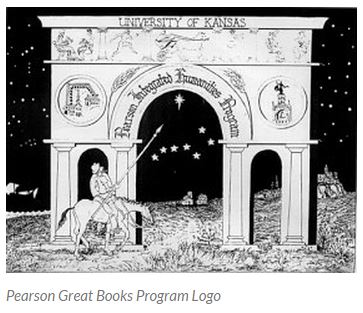 I cannot consider here how every subject can be taught poetically; I only repeat my general rule, that one must always start at the beginning. Biology should start in the field, not in the lab; mathematics should begin with the numbering of things; economics with the ordering of the household and hence with the Oeconomicus of Xenophon. As for advanced study, I believe with Mr. Adler that it belongs in post-graduate, professional and specialized vocational training.
I cannot consider here how every subject can be taught poetically; I only repeat my general rule, that one must always start at the beginning. Biology should start in the field, not in the lab; mathematics should begin with the numbering of things; economics with the ordering of the household and hence with the Oeconomicus of Xenophon. As for advanced study, I believe with Mr. Adler that it belongs in post-graduate, professional and specialized vocational training.
I spoke earlier of the power of the Muses to inspire wonder, the principle of philosophy, and I want to end on that note. The motto of the Integrated Humanities Program (devised by a student) was Nascantur in admiratione. “Let them be born in wonder.” A true schooling in the liberal arts should be like the birth of the human spirit, an entry into a new world that excites interest because it is seen in the light of wonder. The passion of the wonder itself arises from a consciousness of our ignorance before the mystery of being, and from that passion begins the lifelong pursuit of wisdom.
Perhaps the greatest fictional antagonist of wonder is the eminent Victorian pedagogue in Dickens’ Hard Times, George Gradgrind – the ultimate antithesis of the Muses, “With a rule and a pair of scales, and the multiplication table always in his pocket . . . ready to weigh and measure any parcel of human nature and tell you exactly what it comes to” (Ch. 2, 2). Gradgrind’s own wretched children suffered under their father’s tutelage. (How he would have adored our new electronic educators!)
No little Gradgrind had ever learned the silly jingle, Twinkle, twinkle, little star; how I wonder what you are! No little Gradgrind had ever known wonder on the subject, each little Gradgrind having at five years old dissected the Great Bear like a Professor Owen, and driven Charles Wain like a locomotive engine driver. No little Gradgrind had ever associated a cow in a field with that famous cow with the crumpled horn . . . or with that still more famous cow who swallowed Tom Thumb; it had never heard of those celebrities, and had only been introduced to a cow as a gramnivorious, ruminating quadruped with several stomachs. (Ch. 3, 8))
To my regret I find that, in general, new college students (especially the most academically able of them) are pretty much what Gradgrind had in mind as star pupils. Although ignorant of nearly everything, they think they know everything, or if they do not can get it from some reference book or computer. Late adolescent Prufrocks, they have never heard the Muse’s song and never wondered what the whole thing is about. Fortunately, it is not too late for them, but if they find the university to be only another Gradgrind academy, their future is likely to be the Wasteland, a universe where, as in the university that takes its name from the universe, all semblence of unity has disappeared.
Literature Creed
Dickens, Charles. Hard Times, London: J.M. Dent, 1966.
Hopkins, Gerard Manley, Poems of Gerard Manley Hopkins, Ed. W.H. Gardner, New York: Oxford University Press, 1952.
Kipling, Rudyard, Rudyard Kipling’s Verse, New York: Doubleday, 1940.
Plato, The Dialogues of Plato. Tr. Benjamin Jowett, New York: Random House, 1937.

